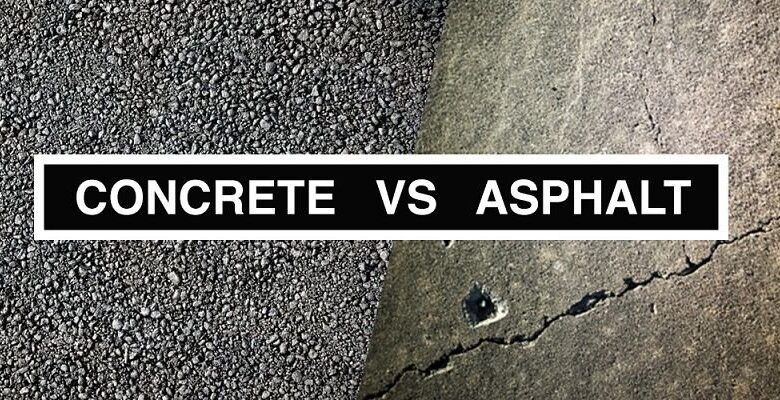Concrete VS. Asphalt Roads: Which Is Better?

Let’s just take some time to appreciate that America is finally experiencing positive changes concerning COVID-19. The narrative is changing. For once, we’re on the offensive. It’s no longer about thousands dying but millions getting vaccinated. It’s safe to say America is gradually winning this fight (though it’s too early to tell). And it’s indeed beautiful to see things going back to the way they used to be.
All the time of being boxed in at home is gradually coming to an end. With this, traveling is in sight for many. It’s indeed a great time to get out there and just have all the fun you’ve not been able to have in the past year.
Talking about traveling, many people just want to have road trips rather than travel by plane. And it’s a good idea since many roads in America are pretty long. To note, America’s longest highway is US 20, which is around 3,237 miles. You can sit in your car and drive for long hours jamming to your favorite music.
As you road trip far and wide, you could be wondering what kind of road is the best suited for travel. Well, it’s about time we take a look at two of the most widely used roads in America: concrete and asphalt. Knowing our roads can indeed go a long way in keeping our travels safe and best of all, fun.
The Case for Asphalt Roads
One of the main advantages of asphalt roads is the price point. It is not as expensive as concrete roads, which makes it attractive as an option. Another good thing is it is also recyclable. So when it is melted down, it can be used in creating something new.
Plus, you really can’t beat the experience with asphalt. It is the smooth ride that comes with asphalt. With asphalt, it is quieter when you’re on the road with your car. It is also known to offer skid resistance and better traction. So when it comes to long travels, you enjoy your ride better with an asphalt road than a concrete road.
Also, with asphalt, there is proper heat absorption and snowmelt. This is because it is black. So the energy from the sun is known to help keep the road clear even when a storm happens. It just helps create the right atmosphere for the road.
Maintaining and repairing asphalt roads are less tasking and cheaper. This makes it a good option for rural areas. And with asphalt, patching can be done without having to replace a whole slab.
As for the disadvantages of asphalt, let’s start with environmental pollution. When asphalt is melted, it is known to contribute to pollution. This is because it creates certain greenhouse gasses.
Even though it’s cheaper, it doesn’t last long. The average lifespan is around 10 years. For this reason, it must be repaired on a more regular basis.
The good thing with asphalt roads is that they can be sealed with bitumen, petroleum residue. By penetration grading of bitumen, the right viscosities to act as road paste can be determined.
Take note that with bitumen, the road attains certain thermoplastic properties. This makes the road becomes more durable to improve its overall lifespan. At the same time, additives won’t need to be added. This helps reduce pollution to a certain extent.
The Case for Concrete Roads
One of the main benefits that come with concrete roads is how long they last. Concrete roads, to boot, can last for about 20 to 40 years. To compare, the lifespan of concrete roads is about 2 to 4 times longer than that of asphalt roads.
Another good thing about concrete roads is that they are recyclable. This means that when they are crushed, they can be used in other ways. So at the end of the day, money spent isn’t wasted even when it breaks.
Also, concrete roads are known to be able to handle a lot of pressure. This is why they are best suited for high truck weight as they can withstand so much tension and weight. It also has a sturdy surface that makes it less prone to rutting and dips. For this reason, it is a preferred option for freeway construction.
Another interesting fact about concrete roads is that they seem to be more environmentally friendly. There is less pollution with concrete roads. Cars that run on concrete roads are also known to have good fuel efficiency.
However, concrete roads are far from perfect. One of its downsides is that repairing them takes a lot of effort. For one, you can’t just fill up holes and cracks. The entire slab needs to be replaced.
When it comes to having smooth rides, concrete is not the guy for you. Because enough grip is needed on the road, its texture causes the tires to be brushed on its surface. This sometimes comes as a noisy and bumpy sound when driving on the road.
Also, and perhaps most importantly, the cost of concrete roads is higher than asphalt roads. This is true both for the installation of the road and in its repair.
So which one is better? Well, there is no straightforward answer to this. But top of that list to consider is your purpose. What is the road for? Knowing what kind of road you need will help you decide what kind of road you should have. And flourish thereafter.
For more article’s visit this website.




